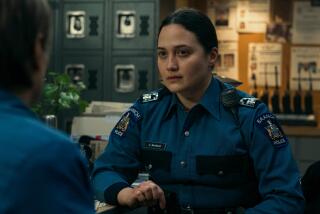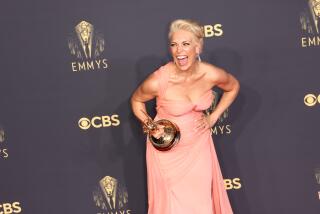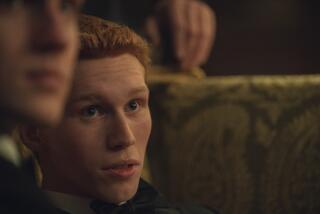‘Downton Abbey’ recap: A shocking crime below stairs
Well, that was awful.
Sunday’s “Downton Abbey” begins as a fun, frivolous return to form, as a party of visitors, including Lady Mary’s new love interest, Lord Gillingham, descend on the estate for an sumptuous dinner. Everyone’s in their most fabulous attire, Lord Grantham is once again imperiling the family fortune, Lady Mary’s “back in the saddle” both metaphorically and literally, the household staff is in disarray, and all the stress is giving Mrs. Patmore a heart attack. Even Isis’ rear-end is back in the opening credits. In short, it’s “Downton Abbey” at its finest.
All of which makes the brutal attack on Anna, one of this show’s loveliest if most long-suffering characters, all the more traumatizing. With less than 10 minutes to go in the episode, she slips away downstairs to treat a throbbing headache. There are signs throughout the episode that Lord Gillingham’s valet, Green, is not a man to be trusted -- like when he reveals, somewhat scandalously, that his real name is Green -- and that he’s perhaps a little too keen on Anna, but his actions are still horribly shocking. (You also have to wonder how such an obvious psychopath made it to such a trusted position.) The rape itself occurs off-screen, but we see Green viciously beating Anna -- a gut-wrenching scene especially when juxtaposed with the glorious Puccini and all-around extravagance upstairs and with the real-life glamour and frivolity elsewhere on the TV dial at the Golden Globes.
Golden Globes 2014: Full coverage | Show highlights | Best & Worst | Top winners/nomineesWhen this episode aired in the U.K. this fall, it was met with a chorus of complaints from viewers who thought Julian Fellowes had gone too far by subjecting Anna to such brutal treatment. Some critics thought it unseemly that a male writer was using rape as a shameless way to inject some life into a series that has been showing its age lately (lest we forget, last week’s two-hour season premiere involved such intrigue as tax accounting and animal husbandry.)
It’s a fair point, I suppose, especially given the number of sexual assault story lines on television in the past year or so -- on “Scandal” and “The Walking Dead.” But then look at the subjects “Downton Abbey” has already dramatized over the course of its four seasons: wrongful imprisonment, death in childbirth, death in a car accident, death while secretly hooking up with Lady Mary, death in the trenches, death by influenza, suicide, miscarriage, paralysis, impotence and shellshock.
That’s a lot of heartache and suffering for one show. I suppose you can accuse Fellowes of running out of ideas at this point in the series, but I don’t think it’s necessarily lazier or less OK to use rape for dramatic fodder than any other form of violence or misery. It’s all about the execution. Joanne Froggatt is a fine actress who movingly conveys the real terror of her situation -- not just during the attack itself, which is surprisingly brutal for this show (even if the rape takes place off-camera), but particularly in its aftermath.
Mrs. Hughes finds her cowered in the corner of her office, her face bruised and bloodied, dress torn and hair disheveled. Anna begs her not to tell anyone, least of all Bates -- “If he knew, he’d murder the man who’s done it and then he’d be hanged,” she says. Moments later, Anna appears in a new dress and concocts a flimsy cover story about fainting to explain the cuts on her face. She insists on walking home alone, leaving Bates to puzzle over her curious behavior.
MORE: Red carpet arrivals | Complete list | Quotes from the stars | Main story | Nominee reactionsSome have argued that by keeping Anna silent out of fear of retaliation by her husband, a convicted felon, Fellowes is using her suffering simply to bolster Bates’ image as a tragic hero. I understand the criticism, but at this point, I think the story is informed by social realism. Notice that one of Anna’s immediate concerns is that someone attend to Lady Mary; she has so thoroughly absorbed the class system that she’s less troubled about her own physical well-being than the possibility that Mary might have to unbutton her own gown or the perception that she’s shirked her duties.
My guess is that for a woman, particularly one of Anna’s position and class background, to report a rape was not exactly an easy thing to do in 1922, and that worry over how a husband might react played a large part in this culture of silence. For Anna to be strong and defend herself, despite the possible ramifications, would probably not be terribly realistic -- then again, it’s not like this show is always committed to social realism (see also: the reaction to Thomas’ sexual orientation).
In any case, I’m going to give Fellowes the benefit of the doubt -- for now at least -- mostly because over the past season or so, “Downton Abbey” has shown a sensitivity to the hardships endured by women in the not-so-distant past. Lady Sybil’s needless death in childbirth remains the most moving moment of the series so far, made all the more poignant by her father’s meddling. Even if her demise wasn’t Grantham’s fault, his paternalism was infuriating, and thanks to the wisdom of British inheritance law, he’s free to squander the family fortune on ill-advised investments while his bright, capable daughters are forbidden from inheriting the estate, much less voting.
It does feel as though Grantham is becoming, if not the show’s villain, then easily its most feckless character, someone who’s as bumbling as Mr. Molesley but thanks to the fickle hand of fate doesn’t have to answer for his poor decisions. This time around, he gets roped into a card game with Sampson, a hustler in Lord Gillingham’s party, and loses a large sum of money. How much, we don’t know, but it’s enough to make him gulp when Cora complains about “grown men” throwing away their fortunes. At this point, Grantham is so consistently reckless with his money he might as well cut a hole in his pants pocket and let the pound notes spill out, or maybe just set fire to the house.
Luckily, Edith’s boyfriend, Michael Gregson, sniffs out the scam, beats Sampson at his own game and returns the lost money to Grantham. The ordeal forces Grantham so soften his stance on Michael, who seems like a genuinely delightful chap, though it seems fairly obvious the situation with Edith is doomed. We shall see.
PHOTOS: Celebrities by The Times
Making Grantham’s irresponsible behavior even worse are his snobbish objections to eating dinner with Dame Nellie Melba, the visiting opera singer. It’s Carson who suggests she eat dinner in her room, away from the family, but Grantham agrees, prompting Cora to ask if she’s “the only member of this family who lives in the 20th century.” Not quite, Cora, but certainly you’re the only one in your marriage who does.
In other developments, this episode introduces Mary to Lord Gillingham, her new love interest. Or, rather, reintroduces: He’s a family friend she hasn’t seen in ages, a la Mark Darcy. All signs point to a budding romance between these two, except for the part where he’s already engaged and she’s still getting over Matthew. There are some wonderful flirty and double entendre-laden exchanges straight out of Season 1 of “Downton Abbey” -- “I haven’t been in the saddle for ages. I’ll be stiff as a board the next day,” she says when Gillingham asks her to go riding, prompting raised eyebrows across America.
On the ride, Mary opens up about Matthew’s death and the double sense of loss she feels -- not only has she lost her husband, but she’s lost the person she was with him. We also learn that Gillingham’s fiance is a wealthy heiress called Mabel Lane Fox, a name so ridiculous there’s no chance she isn’t completely monstrous. But whatever attraction there is between these two, there is at least one obstacle more intractable than an engagement (which on “Downton Abbey” is about as binding a promise as a pinky swear). Though Mary has put on a brave face and tried to move on, she is clearly still haunted by Matthew, so much so that the sight of his gramophone sends her fleeing to her room. Chin up, Mary.
Stray thoughts:
--Dr. Clarkson looks quite dashing in his tux. Isobel, perhaps it’s time to reconsider that proposal?
--Branson, I know you’re feeling out of place, but steer clear of Edna. And ease up on the whiskey while you’re at it.
--Molesley’s saga continues, as he’s reduced to acting as a footman and -- GASP! -- wearing gloves.
--Daisy, look out. Alfred wants to be a chef.
--Is this the first episode in which we’ve heard the family and household staff refer to the rooms at Downton using actual names? (“The Princess Amelia,” “The Chinese,” etc.)
--Line of the night, and possibly the entire series, courtesy of Violet (obviously): “If I were to search for logic, I should not look for it among the English upper class.”
ALSO:
‘Downton Abbey’ recap: Mary moves on without Matthew
Edith comes into her own on ‘Downton Abbey’
Review: Matthew’s death may inject some life into ‘Downton Abbey’
Twitter: @MeredithBlake
More to Read
The complete guide to home viewing
Get Screen Gab for everything about the TV shows and streaming movies everyone’s talking about.
You may occasionally receive promotional content from the Los Angeles Times.






